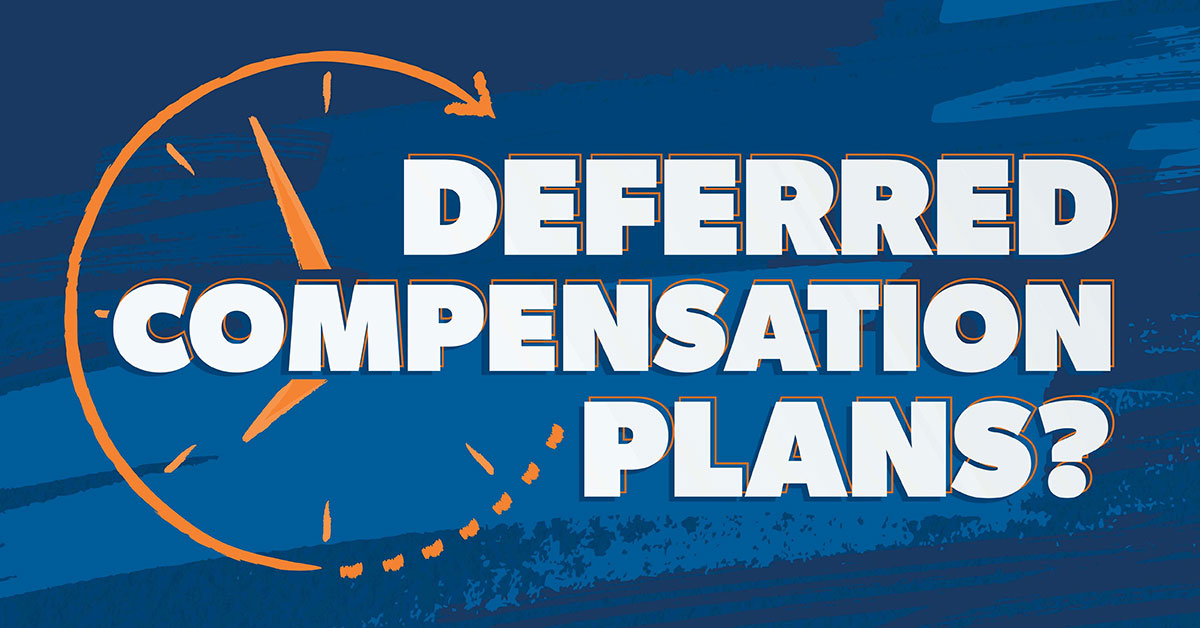
When it comes to saving for retirement, there’s no shortage of options to help you reach your optimal nest egg number. But not all methods are created equal, and some come with a decent amount of risk. (Risk and retirement are not two words we use together lightly!)
A deferred compensation plan is a savings tool that allows employees to put off, or defer, receiving some of their salary until later, like at retirement. But that money doesn’t just sit there piggy-bank style. Nope, it’s being put to work. But by who and for what? Let’s find out!
What Are Deferred Compensation Plans?
A deferred compensation plan sets aside some of your salary in the form of payroll deductions for you to access sometime in the future. That “sometime in the future” is usually retirement, but not always. What’s also deferred are the taxes you’ll pay on those payroll deductions. This is one of the big selling points of deferred compensation plans, especially for what are called highly compensated employees (HCEs), aka the people making the big bucks.
Market chaos, inflation, your future—work with a pro to navigate this stuff.
Consider this, if you’re a high six- or seven-figure earner, it’s likely you’ll pay a decent amount in federal income tax each year. But you can lessen the blow by using a deferred compensation plan whose dollars aren’t taxed until the money is withdrawn.
Depending on how much you invest in your plan (more on that in a moment), you could potentially contribute enough to drop you into a lower income tax bracket. And a lower income tax bracket means lower income taxes.
But for most people, they’ll be dealing with some familiar and popular retirement savings plans. Let’s take a closer look.
Types of Deferred Compensation Plans
There are two different types of deferred compensation plans: qualified and nonqualified. And one is riskier than the other.
Qualified Deferred Compensation Plans
Qualified deferred compensation plans are tax-deferred pension plans covered by the Employee Retirement Income Security Act of 1974 (ERISA).
Retirement savings plans, like 401(k)s, 403(b)s and IRAs, are considered qualified deferred compensation plans. Both qualified and nonqualified plans are funded with tax-deferred money from an employee’s salary (plus any employer contribution match) and have an agreed upon date when the money will be ready for withdrawal. So, the money isn’t taxed on the way into the account, but it will be when it comes out of the account.
Unlike nonqualified deferred compensation plans (NQDCs, for short), there are contribution limits for qualified deferred compensation plans, including 401(k)s, 403(b)s and some IRAs.1 And those two things—tax deferrals and contribution limits—can make a big difference for the people most likely to take advantage of an NQDC.
Invest Like No One Else
From investing advice to wealth management, find a SmartVestor Pro who speaks your language.
Ramsey Solutions is a paid, non-client promoter of participating pros.
Nonqualified Deferred Compensation Plans
Ever heard the phrase “golden handcuffs”? Well, look no further than a nonqualified deferred compensation plan. NQDCs, also known as 409(a) plans, are most often reserved for those highly compensated employees we mentioned earlier. NQDCs are also often used as a recruitment tool for executive-level prospects. Here’s why.
The more money you make, the more you’ll pay in federal income tax. But if you’re offered an NQDC, which has no contribution limits (and is not governed by ERISA), you can defer as much of your salary as you want into your plan, shaving off that amount from your taxable income. You could potentially contribute so much income that it puts you in an entirely new and lower income tax bracket. This is a big perk if you make a lot of money.
The golden handcuffs come in, though, if you decide you want to leave or retire early. There are big penalties for early withdrawals from an NQDC. Plus, accessing your funds may not even be an option until you reach the agreed-upon date. In that case, it might be more financially sound to stay at your company so you don’t lose your money. Not so golden, huh?
One other important thing to know is that, unlike with a 401(k), the funds you defer in an NQDC may be used in some risky ways, like investing in stocks. When you participate in an NQDC you are basically loaning your money to your employer. There’s the potential not only that they’ll make bad investments with your money, but the company could also go bankrupt, meaning you could lose your contributions altogether. It’s a big risk.
What Is a 457 Plan?
A lesser-known nonqualified deferred compensation plan is the 457 plan. It’s like a 401(k) or 403(b) in that contributions are made through payroll deductions and are tax deferred, but they differ in a few other important ways.
These nonqualified plans are:
- Offered only by state and local governments and some nonprofits2
- Not covered by ERISA so participants can make early withdrawals without penalty3
- Subject to the same contribution limits as qualified deferred compensation plans4
A 457 plan includes a provision that makes it possible for participants nearing retirement to make catch-up contributions for the years they didn’t contribute but could have.5 With that in place, an employee could double their contributions each year leading up to retirement. And some employers will offer both a 457 plan and a 401(k). If they do, you can contribute the maximum amounts to each.
Is a Deferred Compensation Plan Right for Me?
If you’re talking about a 401(k), 403(b), IRA, or even a 457, absolutely. These are tried and true ways to save responsibly for retirement. But in order to outpace inflation, you’ll want to invest in growth stock mutual funds that earn around 10–12% interest. (You should only start contributing to a retirement savings plan if you’re debt-free other than your home, with a 3- to 6-month emergency fund in place.)
If you’ve maxed out all your contributions and still have money to play with, look into a Roth IRA. It isn’t tax-deferred but it grows tax-free, so you get the tax advantage when the money comes out. Most people make more money at the end of their careers than the beginning, so a Roth IRA can be a great way to pay taxes when you’re in a lower income tax bracket and then get the tax advantage when you’re in a higher tax bracket. The point is, you’ve got options that won’t leave you taking on unnecessary risk!
The Right Retirement Plan for You
If all those numbers and letters—401(k), 403(b), IRA—have you turned around, don’t worry! It’s like trying to decipher a foreign language, which is why you should get help from someone who can help you translate—like a financial advisor or investment professional.
Our SmartVestor program can help you find pros in your area who are ready to walk you through your retirement options and create a plan for your finances and individual retirement goals!
This article provides general guidelines about investing topics. Your situation may be unique. To discuss a plan for your situation, connect with a SmartVestor Pro. Ramsey Solutions is a paid, non-client promoter of participating Pros.



